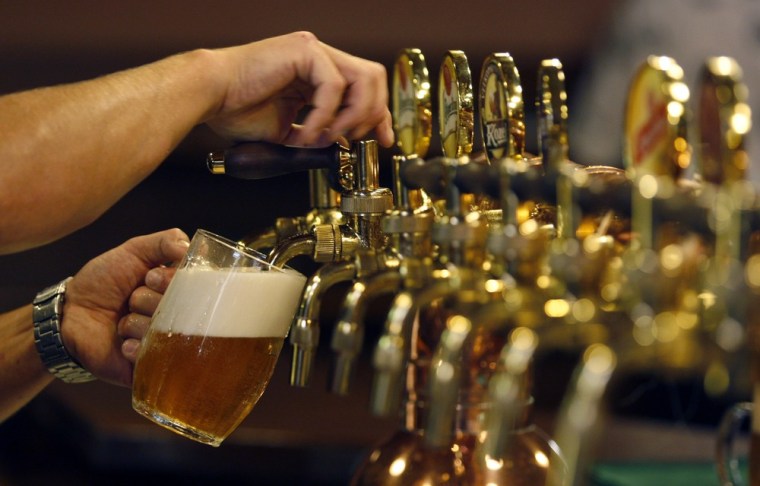There are weepy drinkers, inappropriately affectionate drinkers, giggly and goofy drinkers. But there's one type of reveler you really want to avoid: the angry drinker. New research suggests how to spot one.
Impulsive, live-in-the-moment types are likely to become aggressive when they're intoxicated, according to a new study from Ohio State University's Brad Bushman, a professor of communication and psychology at the school. "We already know that alcohol increases aggression. And people who have aggressive personality traits also tend not to think about the consequences of their actions," Bushman says. "You put the two together, and it's really a toxic mix."
The average age of the study's 495 volunteers was 23, all of whom described themselves as social drinkers and none of whom had any past or present drug, alcohol or psychiatric-related problems. They each took a questionnaire designed to measure which of the participants were future-focused, and which were more impulsive. Half of the volunteers were given alcohol mixed with orange juice; the other half were given orange juice with just a teensy bit of alcohol -- but researchers sprayed the rims of the glasses with alcohol so it smelled like a full-on alcoholic drink (genius).
Then they played a little game: The participants were told they were playing against an unseen same-sex opponent in a speed reaction test, and that the winner got to give the loser an electric shock -- harmless, but still a little painful. (But, actually, they were playing against the researchers themselves.) As the game wore on, the shocks got longer and more intense, making it seem like the opponent was getting meaner and meaner with every win. The more impulsive the participants had rated themselves, the more likely they were to retaliate by upping the intensity and length of the shocks they sent the "losers."
“The less people thought about the future, the more likely they were to retaliate, but especially when they were drunk. People who were present-focused and drunk shocked their opponents longer and harder than anyone else in the study,” Bushman explained. "Alcohol didn’t have much effect on the aggressiveness of people who were future-focused."
While the impulsive types who were not intoxicated did up the intensity of the shocks, it wasn't to the same degree as the impulsive folks who were drunk.
"If you carefully consider the consequences of your actions, it is unlikely getting drunk is going to make you any more aggressive than you usually are," Bushman said.
That's because alcohol is a disinhibitor, explains New York City psychiatrist and regular TODAY contributor Dr. Gail Saltz. It doesn't cause a personality trait; it reveals what's already there, hiding somewhere inside your personality. A drunk friend may appear to be acting out of character, but we don't know what that person might be keeping under wraps, Saltz explains.
Think you're only an angry drunk when you're throwing back, say, shots of tequila? It's not that simple, says Bruce Bartholow, associate professor of psychology at University of Missouri College of Arts and Sciences. (Bartholow led a study we wrote about earlier this year on alcohol and behavior.) Bartholow says there isn't much research looking at how drinking an unfamiliar type of alcohol changes cognitive function.
"There’s a social influence on your drunken behavior," Bartholow explains. "People drink different kinds of things in different situations. If you're at a dinner party at your boss's house, you're probably not going to be doing shots of tequila." There, you might be drinking a good sauvignon blanc, so you learn to associate the experience of drinking wine with mind-your-manners behavior. "There's a difference between what it feels like to be drunk off of wine and what it feels like to be drunk off of shots of tequila because the situations are vastly different," Bartholow explains.
Related:
Post-booze blackout, how people fill in the blanks
